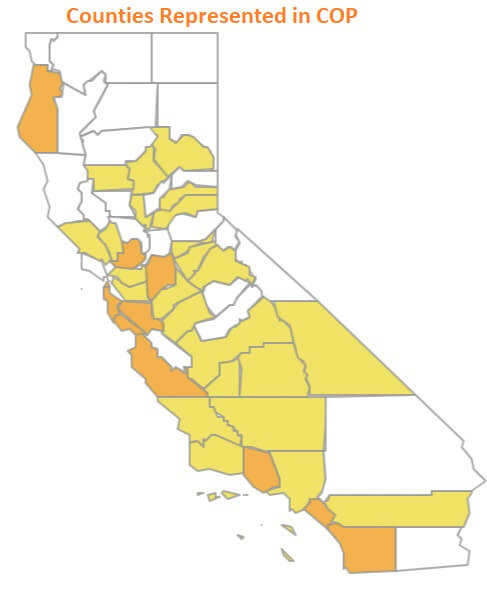California leaders across county offices of education and nonprofit organization, Ten Strands, are joining forces to expand access to environmental literacy through the launch of the Environmental Literacy Community of Practice (COP).
Spearheaded by the County Office of Education (COE) Innovation Hub within California Environmental Literacy Initiative, this group of changemakers will build the capacity of COEs to support districts to advance environmental and sustainability education across the state.
The Community of Practice is open to County Office of Education leaders and staff serving in any role, and thus far features representatives from 37 of the 58 county offices. The COP will meet for themed virtual meetings throughout the year, beginning on Aug. 26 when they tackle COEs as Leaders in Systemic Change. Amity Sandage, of the Santa Cruz County Office

of Education, and Andra Yeghoian, of San Mateo County Office of Education, the first environmental literacy coordinators appointed in the state, will lead the meetings.
“This is an unprecedented commitment from educational leaders across the state who are partnering to deliver climate and environmental justice education to future generations,” Sandage said. “We are well on our way to earning participation from all 58 counties of education and believe that this cross-section of innovators can ultimately shape state curriculum, community, and culture.”
The COP will have a keen focus on equity and supporting those from vulnerable and marginalized communities while working toward strategies that address local environmental challenges and injustices.
CAELI has long pushed for environmental literacy to become a core educational competency, and in 2019 some of its members published Educating Every California Student In, About, and For the Environment: A Call to Action for County, District, and Educational Leaders.
Further, Governor Gavin Newsom, on July 9, signed into law landmark legislation that will allocate $6 million for the creation of free educational resources on climate change and environmental justice.
The momentous bill was signed as part of AB 130 and will make environmental curriculum accessible to all K–12 students throughout the state.
More than 165 nonprofits, county offices of education, school districts, teachers, regional parks, and organizations endorsed this curriculum unit proposal.
“California is being galvanized by the need to recognize climate literacy as an essential discipline in our K–12 school system,” said Karen Cowe, CEO of Ten Strands — an organization that connects the state educational system with environmental literacy opportunities for students.
“This new Community of Practice will deepen the collaboration and connectedness needed across county lines to initiate greater change.”
The urgency for global environmental advocacy was heightened by the recent Intergovernmental Panel on Climate Change (IPCC) report that revealed climate change is increasing with alarming severity and is unequivocally being accelerated by human behavior.

